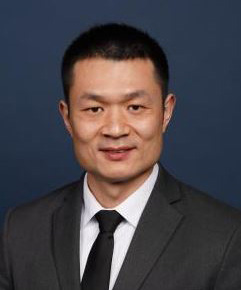Research Team to Probe Mechanism Behind Metastatic Colorectal Cancer
June 30, 2024
Innovations in Cancer | August 2024
A research team from University Hospitals Seidman Cancer Center and Case Western Reserve University School of Medicine has received a prestigious grant from the National Institutes of Health to help develop better treatment options for metastatic colorectal cancer.
 Joseph Willis, MD
Joseph Willis, MD Rui Wang, PhD
Rui Wang, PhDCo-investigator Joseph Willis, MD, Vice Chairman of Translational Research, Pathology, at UH Cleveland Medical Center, is collaborating with fellow principal investigator Rui Wang, PhD, Assistant Professor of Surgery at Case Western Reserve University and UH Cleveland Medical Center, and co-investigator Zhenghe "John" Wang, PhD, Co-Leader of Case Comprehensive Cancer Center’s Cancer Genomics and Epigenomics Program. Together they’re working to understand how endothelial cells in the liver – the organ where over 80 percent of colorectal cancer metastasis occurs – might promote the development of metastatic disease.
Already, they have some answers. Early experimental results show that liver epithelial cells activate a surface protein called HER3 in cancer cells, inducing growth of metastatic colorectal cancer in the liver. But the team is finding that this process occurs in a somewhat unique way.
“We made the paradigm-shifting discovery that the protein LRG1 secreted from liver epithelial cells is a novel HER3 ligand that activates colorectal cancer-associated HER3 and promotes colorectal cancer cell growth,” Dr. Rui Wang says. “We also have preliminary data to show that when you block this LRG1 and HER3 mechanism, the tumors in the liver actually grow much more slowly.”
“We will use the patient-derived specimens in collaboration with UH Cleveland Medical Center to determine whether the newly discovered LRG1-HER3 pathway exists in human pathological conditions,” Dr. Willis says. “As a result, our findings will help us to understand how this novel pathway affects cancer development in humans and how it harms patient outcomes.”
Over the course of the five-year NIH grant, the research team will seek to better understand this never-before-reported mechanism between LRG1 and HER3. Testing the idea that the LRG1/HER3 signaling axis plays a critical role in the development of metastatic colorectal cancer, they’re using knockout mice, an LRG1 neutralizing antibody and patient-derived xenografts and organoids to gain insight. In addition, they’re working to elucidate the specific mechanism by which LRG1 binds and activates HER3. Importantly, the team is also analyzing archived colon cancer and liver metastasis samples from UH Seidman Cancer Center patients to determine the correlation between HER3 activation tumor growth and overall patient survival.
The ultimate goal is to parlay this new knowledge into clinical use, either as a prognostic biomarker for patients with metastatic colorectal cancer or as the basis of a new therapy that could exploit and target the LRG1/HER3 signaling cascade.
“We did one experiment using an antibody to block this pathway,” Dr. Rui Wang says. “But we really need to do a more thorough job just to see how effective this therapy can be for preventing tumor growth and improving tumor-bearing individual’s survival. Patients with metastatic colorectal cancer have substantially worse outcomes than those with primary and localized disease. We’re eager to do the work to create better outcomes for patients.”
Contributing Experts:
Joseph Willis, MD
Vice Chairman, Translational Research, Pathology
UH Cleveland Medical Center
Professor of Pathology
Associate Professor of Medicine
Case Western Reserve University School of Medicine
Rui Wang, PhD
Assistant Professor, Department of Surgery
Case Western Reserve University School of Medicine
Member, Molecular Oncology Program, Case Comprehensive Cancer Center
Zhenghe J. Wang, PhD
Chair and Professor, Department of Genetics and Genome Sciences
Case Western Reserve University School of Medicine
Dale H. Cowan M.D. – Ruth Goodman Blum Professor of Cancer Research
Co-Leader, Cancer Genomics and Epigenomics Program, Case Comprehensive Cancer Center


